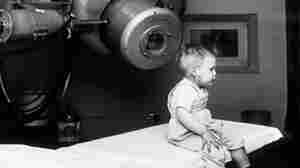
Shots
Health News From NPRA nurse practitioner fills a syringe with the Pfizer COVID-19 vaccine at the Beaumont Health offices in Southfield, Mich., on Nov. 5. Jeff Kowalsky/AFP via Getty Images hide caption
Yanna McGraw is one of about a dozen full-time social workers working at libraries across the Midwest. A representative of the Public Library Association says over the past decade, more libraries have been finding ways to partner with social workers. Darian Benson/WFYI hide caption
When Dr. Tiffany M. Osborn received her COVID-19 vaccination shortly after vaccines became available in late 2020, she felt hopeful about the pandemic's trajectory. A year later, she's sad and frustrated to see so many COVID patients in the ICU. Matt Miller / Washington University School of Medicine hide caption
ICU teams report fatigue and frustration as they brace for omicron surge
Victoria Gray, who has sickle cell disease, volunteered for one of the most anticipated medical experiments in decades: the first attempt to use the gene-editing technique CRISPR to treat a genetic disorder in the United States. Meredith Rizzo/NPR hide caption
First sickle cell patient treated with CRISPR gene-editing still thriving
The COVID antiviral drugs are here but they're scarce. Here's what to know
Limits on virtual addiction treatment may soon return, making care harder to access
People form a large crowd as they attempt to receive COVID-19 testing kits from city workers distributing the kits along Flatbush Avenue on December 24, 2021 in the Brooklyn borough of New York City. The city is handing out thousands of the kits, which include two tests per box, in order to lesson the surge of people in long lines at testing sites. Spencer Platt/Getty Images hide caption
André Lee, administrator and co-founder of Heart and Soul Hospice, stands with Keisha Mason, director of nursing, in front of their office building last week in Nashville, Tenn. Erica Calhoun for NPR hide caption
Yaritza Martinez developed a Zika virus infection in 2016 when she was pregnant with her son Yariel, who is now 5 years old. Yariel is enrolled in a long-term study following a group of babies in the U.S. and in Colombia to see how they have been developing. Meredith Rizzo/NPR hide caption
5 years later, researchers assess how children exposed to Zika are developing
A team of nurses, patient care technicians and a respiratory therapist prepare to return a COVID patient to their back after 24 hours of lying on their stomach. That posture makes it easier to breathe and is a critical part of treatment for COVID patients in hospitals. Alan Hawes/Medical University of South Carolina hide caption
Blake Farmer plays with his kids, Louisa, 2, and Turner, 8, on the trampoline in their backyard in Nashville, Tenn. After Thanksgiving, the family all had breakthrough COVID cases, resulting in a couple weeks spent at home. The trampoline served as a distraction for the kids, Farmer says. Erica Calhoun for NPR hide caption
Radiation was another treatment that researchers were refining at the time. Gordon Isaacs was the first patient treated with the linear accelerator (radiation therapy) for retinoblastoma. Gordon's right eye was removed January 11, 1957 because the cancer had spread. His left eye had only a localized tumor and was treated with the electron beam. Gordon's vision in the left eye returned to normal. NIH/National Cancer Institute hide caption
50 years ago, Nixon gave the U.S. a 'Christmas present,' launching the war on cancer
A firefighter tests the seal on his N95 mask at the start of his shift in Glen Burnie, Md. With the spread of omicron, experts say to wear high-filtration respirators in public indoor spaces for the best protection. Alex Edelman/AFP via Getty Images hide caption
Pfizer's antiviral pill Paxlovid was authorized to treat COVID-19, by the Food and Drug Administration on Wednesday. David Dee Delgado/Getty Images hide caption
Shell neurons (green) project to the breathing center and core neurons (red) project to the pain/emotion center. Brain scientists have found the two are linked, shedding new light on opioid overdoses Salk Institute hide caption
A brain circuit linking pain and breathing may offer a path to prevent opioid deaths
Health authorities have been urging Americans to get a booster shot six months after their second dose of the vaccine, especially now that the omicron variant is dominant in the U.S. Robyn Beck/AFP via Getty Images hide caption
Baby Dorian Bennett arrived two months early and needed neonatal intensive care. Despite having insurance, mom Bisi Bennett and her husband faced a bill of more than $550,000 and were offered an installment payment plan of $45,843 per month for 12 months. Zack Wittman for Kaiser Health News hide caption
A hospital offered a payment plan for baby's NICU stay — $45,843 a month for a year
Kaiser Health News
A hospital offered a payment plan for baby's NICU stay — $45,843 a month for a year
U.S. Army critical care nurse Capt. Edward Rauch Jr. leaves notes on the door of a COVID-19 patient who is on a ventilator at Beaumont Hospital in Dearborn, Mich. Jeff Kowalsky/AFP via Getty Images hide caption
Grief is tied to all sorts of different brain functions, says researcher and author Mary-Frances O'Connor. That can range from being able to recall memories to taking the perspective of another person, to even things like regulating our heart rate and the experience of pain and suffering. Adam Lister/Getty Images hide caption
A Cornell University student waits for a ride with luggage in tow at the campus in Ithaca, N.Y., Thursday, Dec. 16. Cornell University abruptly shut down all campus activities on Tuesday and moved final exams online after hundreds of students tested positive over three days. Heather Ainsworth/AP hide caption






















